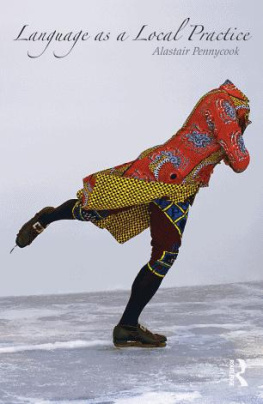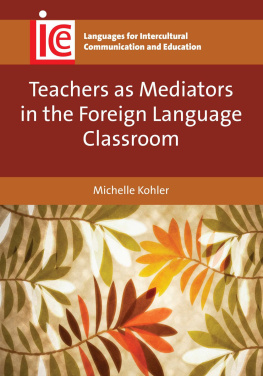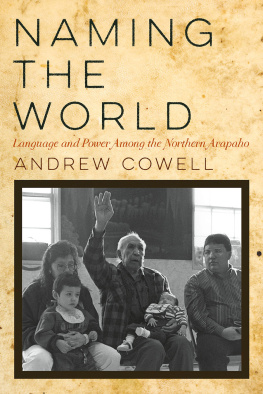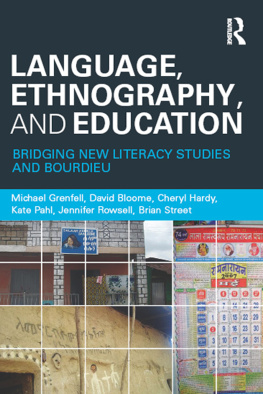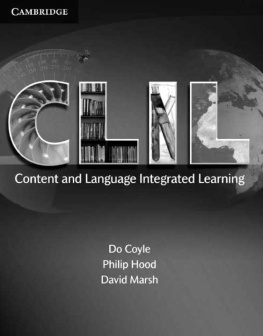
Language as a Local Practice
Language as a Local Practice addresses questions of language, locality and practice as a way of moving forward in our understanding of how language operates as an integrated social and spatial activity.
By taking each of these three elements language, locality and practice and exploring how they relate to each other, Language as a Local Practice opens up new ways of thinking about language. It questions assumptions about languages as systems or as countable entities, and suggests instead that language emerges from the activities it performs. To look at language as a practice is to view language as an activity rather than a structure, as something we do rather than a system we draw on, as a material part of social and cultural life rather than an abstract entity.
Language as a Local Practice draws on a variety of contexts of language use, from bank machines to postcards, Indian newspaper articles to fish-naming in the Philippines, urban graffiti to mission statements, suggesting that rather than thinking in terms of language use in context, we need to consider how language, space and place are related, how language creates the contexts where it is used, how languages are the products of socially located activities and how they are part of the action.
Language as a Local Practice will be of interest to students on advanced undergraduate and postgraduate courses in Applied Linguistics, Language Education, TESOL, Literacy and Cultural Studies.
Alastair Pennycook is Professor of Language Studies at the University of Technology, Sydney. Publications include English and the discourses of colonialism (Routledge, 1998), Critical applied linguistics: A critical introduction (Lawrence Erlbaum, 2001) and Global Englishes and transcultural flows (Routledge, 2007), which won the BAAL Book award in 2008.
Language as a Local Practice
Alastair Pennycook
LONDON AND NEW YORK
First edition published 2010 by Routledge
2 Park Square, Milton Park, Abingdon, OX14 4RN
Simultaneously published in the USA and Canada by Routledge
270 Madison Ave, New York, NY 10016
Routledge is an imprint of the Taylor & Francis Group, an informa business
This edition published in the Taylor & Francis e-Library, 2010.
To purchase your own copy of this or any of Taylor & Francis or Routledges collection of thousands of eBooks please go to www.eBookstore.tandf.co.uk.
2010 Alastair Pennycook
All rights reserved. No part of this book may be reprinted or reproduced or utilised in any form or by any electronic, mechanical, or other means, now known or hereafter invented, including photocopying and recording, or in any information storage or retrieval system, without permission in writing from the publishers.
British Library Cataloguing in Publication Data
A catalogue record for this book is available from the British Library
Library of Congress Cataloging in Publication Data
Pennycook, Alastair, 1957
Language as a local practice / Alastair Pennycook. 1st ed.
p. cm.
Includes bibliographical references and index.
1. Sociolinguistics. 2. Language and languages Variation. I. Title.
P40.P4115 2010
306.44 dc22
2009037317
ISBN 0-203-84622-2 Master e-book ISBN
ISBN10:0-415-54750-4 (hbk)
ISBN10:0-415-54751-2 (pbk)
ISBN10:0-203-84622-2 (ebk)
ISBN13:978-0-415-54750-5 (hbk)
ISBN13:978-0-415-54751-2 (pbk)
ISBN13:978-0-203-84622-3 (ebk)
Copyright 2010 Mobipocket.com. All rights reserved.
Readers Guide
This ebook has been optimized for MobiPocket PDA.
Tables may have been presented to accommodate this Devices Limitations.
Table content may have been removed due to this Devices Limitations.
Image presentation is limited by this Devices Screen resolution.
All possible language characters have been included within the Font handling ability of this Device.
Contents
Acknowledgements
My particular interest in the term practice grew out of a series of seminars and workshops run by my colleagues in the Centre for Research on Learning and Change at the University of Technology Sydney (UTS). I am particularly grateful for the various conversations, discussions, readings and debates with Paul Hager, Alison Lee, Roger Dunston, Donna Rooney, Ann Reich, Hermine Scheeres, Nicky Solomon, Keiko Yasukawa and others, as well as invited speakers such as Bill Green and Steven Kemmis, who were more than generous with their time and ideas. I am fortunate too that the Language Studies Academic Group formed in 2008 has been able to maintain a strong intellectual focus on language matters, and I am grateful to all members of that group for their sustenance. Theo van Leeuwen, a member of that group as well as being Dean of the Faculty of Arts and Social Sciences at UTS, has been magnanimous with his ideas and support. I have been lucky in my colleagues. Meanwhile a new generation of doctoral students has continued to push my thinking in different directions: Julie Choi, Takako Yoshida, Maria Harissi, Marianne Grey, Bong Jeong Lee, Breda OHara Davies. And it is a great pleasure to be able to continue to work with former students, now colleagues and co-authors, such as Celia Thompson, Ros Appleby and Emi Otsuji.
As ever, I am greatly indebted to that wonderful worldwide community of scholars with whom I am privileged to be able to talk through my ideas, and from whom I learn so much, including Lynn Mario Menezes de Souza, Elana Shohamy, Bonny Norton, Vaidehi Ramanathan, Tim McNamara, Stephen May, Brian Morgan, Radhakrishnan, Sinfree Makoni, Suresh Canagarajah, Jan Blommaert, Chris Stroud, Samy Alim, Awad Ibrahim, Ryuko Kubota, Claire Kramsch, Ruanni Tupas, Beatriz Lorente, Angel Lin, Adrian Blackledge, Monica Heller, David Block, Ingrid Piller, Kimie Takahashi, Cynthia Nelson, Brian Paltridge, Martin Nakata, and many others. Thanks as ever to Dominique Estival, flight instructor and real linguist, for attempts to keep my ideas on the straight and level, and for supporting them nonetheless.
A number of parts of this book have been given a public airing elsewhere. Thanks for the chance to talk about the idea of language practices in various forums, amongst which: Popular cultures and the making of new multilingualisms, invited talk at the Multilingual citizenship and cities in transition symposium, University of the Western Cape, Cape Town, South Africa, July 2008; Spatial narrations: Graffscapes and city souls, plenary address at the Applied Linguistics Association of Australia, July 2008; Language as local practice, 24th Annual Singapore Association of Applied Linguistics Distinguished Speaker Lecture, Singapore, April 2008; Changing Practices in Global ELT, plenary address to the IATEFL Conference, Exeter, UK, April 2008; Practice as the new discourse, plenary address to the Discourse and Cultural Practices Conference, Sydney, December 2007. Thanks to all those Lionel Wee, Chng Huang Hoon, Ruanni Tupas, Beatriz Lorente, Ruth Wodak, Chris Candlin, Claire Kramsch, Ryuko Kubota, Ahmar Maboob, Chris Stroud and many others who have given me feedback on these and other talks.
Thanks to Oxford University Press for permission to use , Alibangbang and ecologies of local language practices. Anonymous reviewers have also of course played an important role in the development of these papers.
Next page
